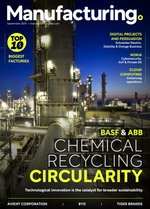BASF & ABB: The Formula for Chemical Recycling Circularity

Sustainability can be fraught with contradiction – on the micro and macro level.
For example: a consumer buying vegan leather, made of plastic, to reduce their environmental impact. Or a manufacturer investing in AI, which uses up to 9 litres of water per kWh of energy, to enhance their energy efficiency.
This contradiction is everywhere. We all participate in and benefit from systems integral to modern life that negatively impact the planet. With the destructive impact of climate change there is an urgent need to reform these systems. But what is the solution when every solution still makes you complicit?
Successful businesses acknowledge the contradiction and are still working to make progress and create positive value. No manufacturer quite embraces this mindset like the global chemicals manufacturer BASF.
Bringing sustainability & chemical manufacturing together
Sustainability has been a concern in the chemicals industry for a long time. Back in 1985 the Responsible Care® initiative was founded – a global, voluntary initiative for the industry to address its environmental and health impacts and responsibilities surrounding risk management and safety.
Today, as public awareness of sustainability and regulations has increased, the initiative runs in 67 countries whose combined chemical industries account for nearly 90% of global chemical production. Chemical manufacturing is inseparable from modern life, critical to the products, places and infrastructure we rely on every single day.
“Chemistry is part of almost any physical product you can imagine, from a car to a fridge to a pair of shoes,” says Matthias Scheibitz, Head of Sustainability Strategy at BASF Performance Materials Division.
“Since we are in raw material transformation as a chemical industry, we are right at the beginning of the value chain.”
BASF’s approach to the value chain embraces the principles of sustainable chemistry during product design, production and disposal. The manufacturer seeks to address two core sustainability challenges: CO2 emissions and plastic pollution.
The threat of pollution is only growing, with 4% of all global CO2 emissions coming from plastic, a statistic set to triple by 2060. Microplastics are now present in virtually everything, from meat to bottled water to plant-based food.
Mia Pettersson, Vice President of Specialty Polymers in the BASF Performance Materials Division, highlights how BASF is tackling this through certified soil-biodegradable films which prevent persistent microplastics.
The manufacturer also works with global food chains to replace polyethylene coated paper in food contact paper packaging with certified compostable solutions in order to increase circularity of these structures.
To tackle CO2 emissions, BASF is aiming to reduce 25% of its emissions from production and energy purchases by 2030 and become carbon neutral by 2050. In the Performance Materials Division it aims to integrate at least 20% circular content into its material volumes by 2030 – content which will come from biomass, recycling or from carbon capture.
Achieving this requires substantial financial investment. Money well spent, in the minds of both Matthias and Mia.
“We approach these investments with the mindset that it's a ticket to play and something we genuinely want to do,” says Mia.
“This is why I love BASF so much. Sustainability is always at the heart of everything we do.”
Creating circularity through ChemCycling®
Both Mia and Matthias are strongly committed to circularity, seeing it as the winning solution to the sustainability challenges of material manufacturing. Targeted approaches to treating, re-using and recycling waste are essential to circularity.
“We are fully committed to the circular economy, all recycling routes are necessary,” asserts Matthias. “It depends on numerous factors which technology is to be preferred.”
Mia, who is leading BASF’s circular solutions, agrees.
“There is no one single silver bullet that will solve what we are going through in terms of transformation,” she says. “That's why we work on a lot of work streams and a lot of solutions, be it mechanical recycling, chemical recycling, organic recycling, pyrolysis, gasification.”
One solution is BASF’s chemical recycling project, known as ChemCycling®. Addressing the ineffectiveness of mechanical recycling on many forms of plastic and mixed packaging waste, this process creates products from this waste on an industrial scale.
This happens through a thermochemical process called pyrolysis which transforms plastic waste into pyrolysis oil. This oil can be fed into BASF’s production network at the beginning of the value chain, substituting fossil resources and contributing to circularity.
ChemCycling® comes with promise and, again, contradiction. Pyrolysis is a more sustainable approach due to its substitution of fossil feedstock and role in enabling plastic recyclability, but it’s also energy intensive, emitting significant CO2 and sulfur dioxide.
In this vein, Matthias highlights BASFs work to develop solutions to make mechanically recycling all plastic and polymer materials more feasible. Part of enhancing overall sustainability is utilising recycling solutions sensibly and thoughtfully, depending on the specific purity and nature of the waste stream.
“ChemCycling® can be a fantastic solution for waste streams that are not recycled mechanically for technological, economic or ecological reasons.” Mia says.
BASF’s Three Major Criteria For Selecting Recycling Technology
- Is it ecologically responsible?
- Is it technologically possible?
- Is it economically feasible?
The challenges of ChemCycling®
ChemCycling®, despite its effectiveness at recycling certain plastics and mixed-polymers, comes with its own distinctive challenges. It’s an emerging technology that needs to be scaled further to develop its full potential. There is also the issue of managing impurities from a mixed waste stream. The solution to both these challenges is investment, which ironically creates further hurdles.
As the manufacturer accrues greater investment they need planning security in place, which requires ChemCycling® to be recognised as part of a legal framework of recycled content.
Mia and Matthias note that existing legislation is ambiguous at best, and BASF customers have to abide by stringent material requirements. Selling further into the market and enhancing outreach, dialogue and education towards customers, politicians and regulatory bodies will be a critical part of tackling this.
Matthias says it’s critical to scale things up to tackle this, making the process tangible so the people writing legislation and building infrastructure better understand the ChemCycling® process.
“The challenge is as an industry we all have to work as one,” Mia adds. “Whatever we do with mechanical or chemical or organic recycling, it requires the whole value chain to work together.”
Working together across the value chain hinges on everyone being on the same page – understanding the sheer sustainable potential of BASF’s recycling solutions. The manufacturer shares this need to spread knowledge with another industry leader, ABB.
ABB & BASF: Spearheading sustainable change
Technology leader and industrial manufacturer ABB recently announced an incredible new electric motor innovation - the MV Titanium. The world's first medium-voltage industrial motor, the MV Titanium enables energy savings of up to 40% and offers complete speed control and connectivity in a singular unit.
Large motors and generators are typically large in size, requiring extensive space and energy to continuously run customers' mission-critical applications. This alternative enhances storage space, efficiency and reduces manufacturers carbon footprint.
With global electricity demand set to increase by 4% this is another system that needs sustainable reform. ABB is here to deliver that, building on the motor that has powered industry for decades.
“136 years ago in 1888, Nikola Tesla invented the induction motor,” says Jari Jäppinen, Technology Manager at ABB Motors and Generators.
“Since then the three-phase induction motor has been the backbone of the whole industry. These motors are very reliable, efficient and they can operate for a very long period of time. The ABB titanium motor is the same, with efficiency of 98%.”
By delivering sustainability without sacrificing efficiency or quality, ABB is helping strengthen the grid to power the clean energy transition.
“We need to recognise that the world is changing,” says Heikki Vepsäläinen, ABB’s President of Large Motors and Generators. “Different power generation forms are coming into the grid, more renewable, more wind, more solar. That means the grid needs to be stable.
“Things are going to be electrified. That's where ABB is able to help customers and investors make the journey to net zero.”
ABB exists in contradiction with sustainability too, part of the same energy industry that has contributed to climate change. But like BASF, they embrace what Matthias calls their “special responsibility” to spearhead change and sustainable innovation.
Matthias points to BASFs delivery of polyurethane systems that serve as insulation materials for housing and how the company reduces emissions in the automotive industry through engineering plastics for weight reduction.
“We are, to a certain extent, part of the challenge, because we are large emitters with our big production plants,” he says. “ But we’re also part of the solution.”
Mia agrees, saying: “It’s a lot of work. Luckily we are stubborn like crazy, so we are not giving up.”
To read the full story in the magazine click HERE
******
Make sure you check out the latest edition of Manufacturing Digital and also sign up to our global conference series - Procurement & Supply Chain 2024 & Sustainability LIVE 2024
******
Manufacturing Digital is a BizClik brand.
- Saudi Aramco SATORP & Chemanol Secure 20-Year DealProduction & Operations
- Dr Schär's Sustainable Packaging & Gluten-Free InnovationsSustainability & ESG
- Gen AI’s Impact on Chemical & Pharmaceutical ManufacturingAI & Automation
- Johnson Matthey to build hydrogen fuel cell factoryProcurement & Supply Chain


